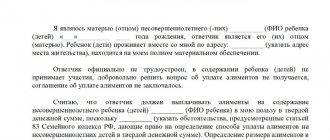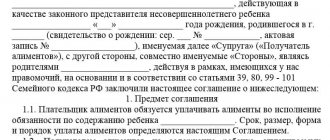Assistance in supporting a disabled child
Almost always, child support is paid until a child with a disability turns 18, but if, after reaching the age of majority, he continues to be considered incompetent, he has the right to continue to receive child support. There are also differences in payments for children of disability groups I, II and III - the first two groups often imply the impossibility of finding a job, and therefore the child can sue his parents and receive alimony after 18 years.
Things are more complicated with disability group III - it implies limited ability to work, but allows you to get a job. Therefore, a group III disabled person will be able to receive alimony only if he can prove to the court that the job he has found will significantly worsen his situation, or that he requires regular treatment that costs money.
Changing the payment amount
The established amount of alimony for disabled children by a court decision and in the absence of an agreement on their payment can be changed either upward or downward. De jure, according to Art. 119 of the RF IC, the basis for this is a change in the financial or marital status of one of the parties.
From the literal interpretation of this norm it follows that the presence of at least one of the above conditions is sufficient. For example, the birth of children after the amount of alimony for the first child has been established may serve as a basis for revising the initial amount of maintenance (see the ruling of the Moscow City Court dated August 19, 2016 No. 4g/7-9248/2016 on complaint No. 4g-9248/2016).
However, in most cases, the courts have a different opinion and believe that in order to satisfy the requirements for review of the amount, a combination of both grounds is necessary, i.e., a change in both the financial and marital status of the parties (see Section VIII of the Review of Judicial Practice, approved by the Presidium of the Supreme Court RF 05/13/2015).
At the same time, de facto there are other grounds, in the presence of which the court may come to the conclusion that it is necessary to change the awarded amounts.
Revising the amount of alimony upward
According to Art. 86 of the RF IC, by court decision, additional child support payments may be imposed on parents due to exceptional circumstances:
- injury;
- serious illness;
- the recipient's need for paid care, social adaptation and/or integration into society.
Also considered as exceptional expenses are expenses for special means of transportation, training and care, prosthetics, purchase of medicines, etc. (clause 40 of the resolution of the Plenum of the Armed Forces of the Russian Federation “On the application of legislation by courts...” dated December 26, 2017 No. 56).
At the same time, spending on education is considered exceptional only in relation to the need to improve health. Payment for tuition at a university is not such (decision of the Kuibyshevsky District Court of Omsk dated November 22, 2018 in case No. 2-4632/2018).
Change in content value downwards
Certain circumstances may lead to a reduction in the amount of alimony if their presence prevents payments in the same amount.
| № | Circumstance | Legal justification |
| 1 | The recipient of alimony goes to work or registers as an individual entrepreneur | Sec. VIII Review of Judicial Practice, approved. Presidium of the Supreme Court of the Russian Federation 05/13/2015 |
| 2 | The impossibility of the alimony payer to carry out previous work due to disability or illness | |
| 3 | The need to support other family members who have become disabled | |
| 4 | Restoring the recipient's ability to work | Clause 8 of Resolution of the Plenum of the RF Armed Forces No. 56 |
| 5 | Loss of ability to work by the alimony payer |
How much alimony is paid for the maintenance of a disabled child?
Contrary to the general belief that children with disabilities are paid more alimony than healthy children, a disabled child receives alimony from the second parent in the same amount:
- 1/4 of all earnings (if there is one child in the family);
- 1/3 of the total income , if the ex-spouse pays alimony for the maintenance of two children;
- 1/2 part of the salary if divorced spouses have three or more children.
It is another matter if a child with disabilities needs to undergo expensive treatment, constant supervision and care, or rehabilitation - and in such situations, the other parent is obliged to increase the amount of payments to help pay the corresponding expenses. Until the dependent is eighteen years old, the amount of alimony will not depend on the disability group.
It is worth keeping in mind that if the second parent does not have a permanent source of income, he will still pay alimony, only now they will be calculated in a similar percentage, and the average salary in Russia will be taken as the basis for calculations. In order for bailiffs to be able to withhold alimony from the father of a child, it is not necessary that he receive a salary - they can seize part of the funds from fees for work, pension payments, bonuses, income from the activities of individual entrepreneurs, profits from leasing real estate or from the sale of property.
Alimony in Kazakhstan: calculation of the amount and procedure for collecting alimony Printable version
Depending on various life situations, it may be necessary to pay or request alimony. In this article you will learn what alimony is, who can and should pay alimony, what is the procedure for requesting alimony, the amount of alimony provided for by law, and what to do if alimony is not paid.
Alimony is monetary or material support that one person is obliged to provide to another person who has the right to receive it, in accordance with the Code “On Marriage (matrimony) and Family”. The most common case of alimony is child support payments, but alimony can be paid to mothers of children, spouses who cannot support themselves, and parents.
Child support is a legal responsibility of parents, and it does not matter whether the parents are married, in a civil partnership, or divorced. Children under guardianship, guardianship or foster care, as well as adopted children, are also entitled to child support. According to Article 6 of the Code, amounts due to the child as alimony are placed at the disposal of the parents or other legal representatives of the child and are spent on the maintenance, education and upbringing of the child.
Who is entitled to pay alimony?
Alimony for minor children
Parents are obliged to support their minor children; the procedure and form of this support is determined by the parents independently.
Parents have the right to enter into an agreement on the maintenance of their minor children (agreement on the payment of alimony) in accordance with Chapter 20 of the Code. If parents do not provide their children with maintenance, this was not agreed upon in court by agreement, or one of the parents did not file a claim in court to collect alimony, then the claim may be filed by the guardianship and trusteeship authority. When a marriage is dissolved, the court considers the following agreement:
- about who the minor children will live with;
- on the procedure for paying alimony for the maintenance of children or a disabled spouse;
- on the amount of child support;
- about the division of property (find out who has the right to what during a divorce).
If there is no such agreement between the spouses, or it contradicts the interests of the children or one of the spouses, then the decision on these issues is determined by the court. Parents deprived of parental rights are also required to pay child support in accordance with Article 79 of the Code. Payment of alimony on the basis of an agreement is a voluntary method of paying alimony, and by a court order, based on a filed claim, it is forced (below in the article you will find information on how to collect alimony).
In addition to child support, additional amounts may be withheld from parents for the maintenance of children. There are exceptional circumstances - serious illnesses, injuries of minor children or incapacity for work of adults who need help from children, if it is necessary to pay for outside care for them, etc.
Alimony to spouses and ex-spouses
According to Article 147 of the Code, spouses are obliged to financially support each other. In addition to child support, there are a number of cases where support for a spouse or ex-spouse may be required. If there is no agreement or understanding, then the following may file a claim in court to collect alimony:
- disabled needy spouse;
- spouse during pregnancy and for 3 years from the date of birth of a common child;
- a needy spouse caring for a common disabled child until he reaches the age of 18, as well as in the event that the common disabled child is assigned a disability group of I - II upon reaching 18 years of age.
The amount of alimony and the payment procedure are determined by the court. In a number of cases, the court may refuse to order alimony payments to the ex-spouse if the incapacity for work resulted from the abuse of alcoholic beverages, narcotic drugs, psychotropic substances or as a result of the commission of an intentional crime; due to the short duration (up to 5 years) of the marriage and if the spouse demanding alimony payments behaves unworthy.
Alimony for adult but disabled children
According to Article 143 of the Code, able-bodied parents are obliged to support their disabled adult children who need help. In this case, in the absence of an agreement, the amount of alimony is determined by the court based on the financial situation of the family, and will be a multiple of the MCI. If there is no agreement or agreement between the parents, then the payment procedure and amounts are determined by the court, taking into account the financial situation of both parents and other conditions. Moreover, alimony can be requested both for actual needs and for future ones that may be needed in the future.
Child support for adult children to support disabled parents
Able-bodied adult children are obliged to support and care for their disabled parents in need of help. If children do not support their disabled parents voluntarily by agreement, then the parents can sue for alimony. In this case, you can apply for either one or all children, but it is worth considering that parents who have not fulfilled their obligations are unlikely to receive an affirmative court decision, especially since parents who have been deprived of their rights cannot apply for such alimony.
In addition to the cases listed above, there are alimony obligations for grandchildren and grandparents, pupils and teachers, and other family members.
How much should child support be paid?
If, during a divorce, an agreement was drawn up between the spouses on the procedure for payment and the amount of alimony, then in fact the payment must correspond to the agreement. If there was no agreement on the payment of alimony, then, in accordance with Article 139 of the Code, alimony for minor children is collected by the court from their parents.
Alimony must be paid monthly in the amount of:
- for one child - one quarter (1/4) of the earnings and/or other income of the parents;
- for two children - one third (1/3) of the earnings and/or other income of the parents;
- for three or more children – half (1/2) of the parents’ earnings and/or other income.
In some cases, the size of these shares may be reduced or increased by the court, taking into account the financial or marital status of the parties and other noteworthy circumstances such as other children, etc.
The only limit on the amount of deduction from the salary of the alimony payer is Article 95 of the Law “On Enforcement Proceedings and the Status of Bailiffs”, according to which the debtor must retain at least 50% of the salary or other income.
What types of earnings can alimony be deducted from?
There is an approved List of types of wages and/or other income from which alimony for the maintenance of minor children is withheld, which states that alimony for the maintenance of minor children is withheld from all types of wages (monetary remuneration, maintenance) and other income that parents receive.
In this case, it does not matter at all in what currency - national or foreign. Thus, alimony is withheld: 1) from wages accrued to employees for time actually worked or for work performed, based on the established official salaries (rates) provided for by the remuneration system; 2) from all types of additional payments and allowances provided for by the wage system, as well as from allowances received through savings within the wage fund, or funds provided for the maintenance of the relevant institution; 3) from bonuses (monetary rewards) provided for by the remuneration system; 4) from all compensation payments , with the exception of payments: provided for in paragraph 7 of Article 98 of the Law of the Republic of Kazakhstan “On enforcement proceedings and the status of bailiffs”; 5) from wages saved during the vacation, as well as from monetary compensation for unused vacation, in the case of combining vacations for several years; 6) from commissions (insurance agents, brokers); 7) from income received for work performed , services provided under contracts concluded in accordance with civil legislation and not of a one-time nature; from royalty payments ; 9) from all types of pension payments , from state social benefits, with the exception of benefits provided for in Article 98 of the Law of the Republic of Kazakhstan “On Enforcement Proceedings and the Status of Bailiffs”, from amounts of targeted social assistance; 10) from scholarships paid to students in educational organizations; 11) from income from engaging in entrepreneurial activities without forming a legal entity; 12) from income from rental property ; 13) from income from securities and other income from participation in the management of the property of a legal entity; 14) provided for by subparagraph 1) of Article 13 of the Law of the Republic of Kazakhstan “On social protection of citizens affected by nuclear tests at the Semipalatinsk nuclear test site” and subparagraph 2) of paragraph 1 of Article 13 of the Law of the Republic of Kazakhstan “On social protection of citizens affected by environmental disasters in the Aral Sea region” "
from royalty payments ; 9) from all types of pension payments , from state social benefits, with the exception of benefits provided for in Article 98 of the Law of the Republic of Kazakhstan “On Enforcement Proceedings and the Status of Bailiffs”, from amounts of targeted social assistance; 10) from scholarships paid to students in educational organizations; 11) from income from engaging in entrepreneurial activities without forming a legal entity; 12) from income from rental property ; 13) from income from securities and other income from participation in the management of the property of a legal entity; 14) provided for by subparagraph 1) of Article 13 of the Law of the Republic of Kazakhstan “On social protection of citizens affected by nuclear tests at the Semipalatinsk nuclear test site” and subparagraph 2) of paragraph 1 of Article 13 of the Law of the Republic of Kazakhstan “On social protection of citizens affected by environmental disasters in the Aral Sea region” "
At the same time, the collection of alimony from military personnel, law enforcement officers and special government agencies is made from the following types of payments received by them in connection with the performance of official duties:
1) from official salaries, from salaries for military, special ranks, additional payments for special ranks or class ranks and allowances for special conditions of service established by the legislation of the Republic of Kazakhstan; 2) provided for by subparagraph 1) of Article 13 of the Law of the Republic of Kazakhstan “On social protection of citizens affected by nuclear tests at the Semipalatinsk nuclear test site” and subparagraph 2) of paragraph 1 of Article 13 of the Law of the Republic of Kazakhstan “On social protection of citizens affected by environmental disasters in the Aral Sea region” "; 3) from bonuses (monetary rewards) that are permanent and one-time in nature , provided for by the remuneration system and obtained through savings in funds provided for the maintenance of the relevant body; 4) from the amounts of allowances and additional payments received from savings in funds allocated for the maintenance of the relevant body; 5) from all types of compensation payments, with the exception of:
- lump sum compensation paid in the event of injury;
- compensation payments for work in harmful or extreme conditions;
- the amount of money paid to victims of environmental impact during the liquidation of the consequences of natural and man-made emergencies;
- targeted compensation for renting a home;
- monetary compensation paid to recipients in exchange for the right to free privatization of official housing, which is not subject to privatization, including due to its location in closed and separate military camps, border outposts and commandant's offices;
- the amount of money paid to reimburse the costs of treatment within the guaranteed volume of free medical care;
- a sum of money paid to reimburse the cost of travel by transport across the territory of the Republic of Kazakhstan when moving in service, dismissal from military service, when going to hospital treatment and back, as well as for transportation of up to ten tons of own property when moving from service and leaving military service services;
- amount of money paid to reimburse postal costs;
- amount of money paid to reimburse training costs;
- lifting allowances for official movements associated with moving from one locality to another; compensation payments to employees sent on business trips;
- cash compensation paid to pay utility costs;
- compensation payments related to reimbursement to military personnel, employees of law enforcement and special government agencies for expenses incurred by them in connection with the performance of official duties.
6) from official salaries (scholarships) of cadets (students) of military educational and special educational institutions.
The law does not establish the minimum or maximum amount of income from which alimony should be withheld, since alimony is withheld from almost any amount of income that is officially confirmed.
How to draw up an agreement on the payment of alimony?
According to Article 157 of the Code, an agreement on the payment of alimony (the amount, conditions and procedure for paying alimony) is concluded between the person obliged to pay alimony and its recipient, and in case of incapacity of the person obliged to pay alimony and/or the recipient of alimony - between the legal representatives of these persons.
The agreement is concluded in writing and must be certified by a notary. If the financial or marital status of the spouse paying alimony under the agreement has changed, then it is necessary to file an application with the court to amend or terminate this agreement to pay alimony. The amount of alimony in this case is specified in the agreement, but it cannot be lower than the amount of alimony assigned by the court.
How to collect alimony in court?
If it was not possible to reach an agreement, or one of the parties refuses to pay alimony voluntarily, then you can file an application with the court and forcefully collect alimony. To do this, you must apply to the court with a statement of claim, always at the place of registration of the defendant spouse.
Collection of alimony is the process of forced collection of alimony from a person who, for one reason or another, evades their voluntary payment. You can apply to the court to collect alimony, regardless of the period that has elapsed from the moment the right to alimony arose, if alimony was not previously paid under an agreement on the payment of alimony. In this case, alimony is awarded from the moment the person goes to court, and for the past period can be required for no more than 3 previous years, if it is established that before this period no money was transferred for maintenance.
To apply to the court for alimony, the following documents are required:
- Statement of claim for alimony, as well as a copy for the defendant.
- Copy and original identification document.
- Documents confirming the circumstances on which the requirements are based, copies of these documents for defendants and third parties if they do not have them: marriage certificate, divorce certificate, child birth certificate, paternity certificate, etc., depending on the specific situations.
Other documents may also be required, depending on the specific circumstances; before going to court, you can contact and clarify the list of documents for your situation.
According to Article 616 of the Tax Code, Plaintiffs in claims for alimony in the courts are exempt from paying state fees.
According to Article 140 of the Code of Civil Procedure, if a demand is made for the collection of alimony for minor children that is not related to establishing paternity or the need to involve third parties, then a court order will be issued. The court order will indicate the date and place of birth of the debtor, his place of work, the name and date of birth of each child for whose maintenance alimony is awarded, the amount of payments collected monthly from the debtor and the period for their collection. The court order is signed by the judge, then it is sent for execution to the departments for the execution of judicial acts.
Subsequently, the deduction of alimony from wages is the responsibility of the organization’s accountant (usually). The basis for deduction and transfer of alimony from wages may be: a notarized agreement, a court order or a writ of execution .
The bailiff can and should exercise systematic control over the correctness and timeliness of alimony withholding. At least once a quarter and at the request of the creditor at any time.
According to Article 75 of the Code, if parents evade parental responsibilities, including maliciously evading payment of alimony, then they are deprived of parental rights.
Conditions under which alimony is calculated for the maintenance of a disabled child aged 18
If alimony is paid for the maintenance of a child with disabilities, its payment may be extended when the child reaches the age of majority:
- if the child is recognized as disabled and is assigned disability group I or II;
- if the child is in need of funds.
Adult disabled people of group III have the right to independently file a claim for alimony, and it will be satisfied if the disability prevents them from finding a job, or the child incurs constant expenses for treatment.
Reducing the amount of alimony
You can apply to the court to reduce the amount of alimony payments on the following grounds:
- High income of the payer. If, as a percentage of alimony, the debtor’s income is significantly higher than the minor’s needs, the payer may apply to the court to order monthly payments in a fixed amount.
- Receipt by a disabled child of real estate or movable property that can generate him an amount of income sufficient to meet basic material needs.
- Significant deterioration in the financial situation of the debtor (loss of job, birth of a child in a new family, disability of other minor children or their illness).
How to apply for child support for a disabled child
Alimony for the maintenance of a disabled child is assigned in a fixed amount, and can be arranged as follows:
- by signing an agreement with the other parent, the text of which would indicate all the conditions for making payments, terms, amounts, procedure for accruing funds (the document must be notarized, otherwise it will not have legal force);
- by filing a claim with the magistrate’s court at the place of residence of the plaintiff or defendant for the assignment of alimony support for a child with a disability;
- through an independent (or through a legal guardian) appeal to the court by a disabled child who has reached the age of majority (if the claim is satisfied, receiving alimony will not affect the possibility of receiving other benefits, pensions and other payments).
Increasing the amount of alimony
You can increase the amount of alimony payments by filing a corresponding statement of claim. It must indicate the specific amount of the claim. Documents proving the existence of expenses must be attached to the claim.
The list of evidence includes the following documents:
- accounts;
- contracts;
- checks, etc.
When considering a case, the court considers every aspect:
- financial situation of the alimony recipient and the payer;
- expenses that the recipient has incurred or will have to incur in the near future;
- needs of a disabled child.
When alimony payments increase, the court makes a decision to assign a fixed amount of charges.
How to legally increase child support for a disabled child
If the child’s mother incurs significant costs for paying for medical procedures for a disabled child, his recovery, sanatorium treatment, care for him, and so on, she has the right to demand from his father an increase in alimony. When filing a claim in court, a woman must attach documents confirming the incurrence of costs. These can be bills, checks, receipts, agreements for child care, and treatment.
The court decision will be made taking into account:
- financial condition of the mother and father of the child;
- the amount of costs already incurred and future costs for child care;
- the child's needs.
If the decision is made in favor of the mother and the alimony amount is increased, payments will be made in a fixed amount.
How to legally reduce child support for a disabled child
It also happens that the second parent is not able to pay child support in the amount that was specified in the agreement or court decision. You can ask the court to reduce the amount of alimony if:
- the second parent’s financial situation has deteriorated significantly since the court’s decision (he was assigned a disability group, his other children got sick, he was fired from work, he stopped working as an individual entrepreneur, remarried and had new children, etc.);
- a disabled child has received property, thanks to which he receives money (for example, rents out an apartment) and thereby fully supports himself;
- the income of the second parent has grown so much that the percentage of payments that was previously assigned by the court not only provides everything necessary for a disabled child, but also many times exceeds his needs (child support will be paid in a fixed amount).
What documents are needed to collect child support for a disabled child?
To file a claim with the court for the payment of alimony by the father of the child, you will need to provide the following set of documents:
| Document | Where to get it |
| Photocopy of the statement of claim | – |
| Birth certificate of the child for whom child support is assigned | Civil registry offices |
| Certificate of divorce from the child's father | Civil registry offices |
| Certificate of family composition to confirm cohabitation with the child | Housing department, passport office |
| Conclusion of a medical and social examination on assigning a child a disability group | ITU Bureau |
| Certificates of income of the father and mother of the child | Form 2-NDFL, at the place of work or at the branch of the Federal Tax Service of the Russian Federation |
| Certificates of receipt of a pension, benefits and other payments (in the absence of work) | Employment Center, Pension Fund, etc. |
List of documents required to collect alimony payments
In order to recover child support for a disabled child through the court, you must prepare the following package of documents:
- lawsuit;
- marriage document (if available);
- child's birth certificate;
- medical certificate confirming the status of a disabled person;
- a certificate from work about the income of the debtor and the claimant (or documents from social security about the lack of work of the parties);
- an extract from the housing department confirming that the claimant lives with a disabled person.
The state fee for claims of this nature is not paid.
Alimony for disabled children is not particularly different from alimony for children of other categories.
The main difference is the need to support the child’s mother if the minor is completely incompetent, and also to pay alimony when the child reaches adulthood of the first and second disability groups.
5 / 5 ( 1 voice )
Features of payment of alimony for the maintenance of a disabled child
If the child’s mother is going to file a claim for alimony payment to her, but does not know where the child’s father lives, she has the right to apply to the department of the Ministry of Internal Affairs to put the defendant on the wanted list. This will also be useful if the child’s mother wants to apply for additional cash benefits for her child through the social protection authorities.
As soon as the father of the child is found, the trial begins. And if a decision is made to accrue alimony for a disabled child, the bailiff service receives a writ of execution and begins enforcement proceedings. From the moment the court makes a decision, the father of the child receives an obligation to pay child support.
If alimony is not paid for more than six months, a penalty for alimony payment will be added to the total amount of debt. Read about this in the article ⇒ “How to calculate the penalty for alimony.”
Common mistakes
Error: Child support was awarded by the court in a fixed amount, so the father of the child has been making the same payments for many years.
Comment: Despite the fact that the court sets a fixed amount for payment as alimony, the amount of payment changes over time due to indexation and an increase in the regional children's subsistence level.
Error: The child’s second parent continues to pay child support, which was forcibly collected from him by a court decision, while the child was declared legally competent following the results of a regular medical and social examination.
Comment: From the moment the child is recognized as legally competent and the disability is canceled based on the results of a medical and social examination, the alimony payer has the right to reduce the amount of payments if the child is 18 years old, or cancel payments altogether if the child is an adult.
Conditions of receipt
Until children with physical disabilities reach the age of 18, the main condition for them to receive alimony payments is age and need . After reaching adulthood, it is necessary for the child to be recognized:
- those in need;
- disabled.
Only in this case can they count on continuing to receive maintenance. Disabled people of groups 1 and 2 may be recognized as completely disabled. Disabled people of group 3 are considered persons whose ability to work is reduced, but not completely lost . Disabled adults may receive monthly alimony in a fixed amount.
Answers to common questions about child support for a disabled child
Question No. 1: If a disabled child reaches the age of majority, sues his parents and begins to receive alimony from them, will he be deprived of the right to receive a disability pension?
Answer: No, receiving alimony does not interfere with the registration of a disability pension, benefits, benefits and subsidies.
Question No. 2: Can a mother independently determine the amount of alimony based on the incurred and future expenses for maintaining a disabled child?
Answer: No, a woman can only present to the court certificates and receipts about the costs incurred, as well as documents indicating the need to bear the costs of caring for the child in the future. The court, in turn, independently determines the amount of alimony, based not only on the costs of caring for a disabled person, but also on the income of the parties.
https://youtu.be/https://youtu.be/9M59tKNfF8o
_
Decor
In order to arrange alimony payments for a son or daughter with physical or mental disabilities, you should choose the most suitable method. It could be:
- reaching a voluntary agreement between the parties, as a result of which an agreement is drawn up, which fixes the amount and procedure for payment of funds, and which is subject to notarization ;
- filing a claim with the judicial authorities (at the place of residence of the defendant or plaintiff), if the only possible option is the forced recovery of funds for the child.
Claims are filed either by the child’s legal representative (parent, guardian, trustee), or by the child himself, if he has reached the age of majority and needs financial assistance. The court will side with the plaintiff if he is disabled and cannot provide for himself. Even if he receives pensions, benefits and scholarships, and owns certain income-generating property, his right to alimony cannot be limited .
In cases where alimony was collected on the basis of a court decision before the age of 18, after reaching the age of 18 the child in need must submit a new application to the judicial authorities in order to be able to receive alimony in the future.
Unless otherwise established by agreement of the parties, alimony is collected in a fixed amount. This takes into account the financial and marital status of the parties, as well as some other factors.








